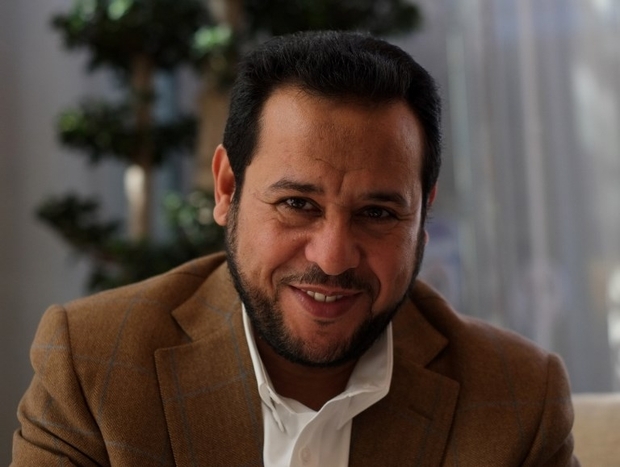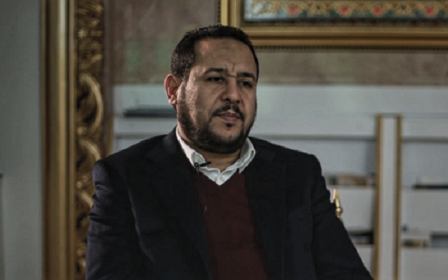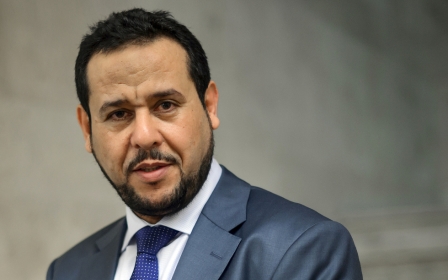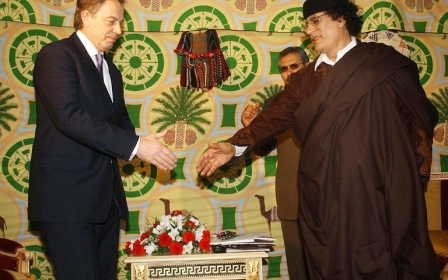Belhaj case: UK government seeks secret hearing in new court battle

The British government on Thursday revealed the full extent it is prepared to go to cover up its involvement in the 2004 abduction and subsequent torture of Libyan dissident Abdel Hakim Belhaj in a plot hatched with the CIA and agents of the former Libyan dictator, Muammar Gaddafi.
Lawyers for Mark Allen, former head of counter-terrorism at Britain’s foreign intelligence agency, MI6, told the High Court in London that the reasons he was not prosecuted must be kept secret.
It is the first time the government has argued that new “secret courts” – with the media, the public, and even lawyers not vetted by the government excluded – should be used in a criminal case in Britain.
Despite a four-year police investigation and clear evidence of MI6’s role in rendering Belhaj and his wife, Fatima Boudchar, to Tripoli, Britain’s Crown Prosecution Service, led by the director of public prosecutions (DPP) Alison Saunders, said last year it was “impossible to reconcile conflicting evidence about what happened at the time”.
Lawyers for Belhaj, a then-exiled former leader of the Libyan Islamic Fighting Group, and Boudchar say the reasons for the failure to prosecute Allen – and anyone else – over their rendition from Malaysia to Tripoli must be revealed. “The DPP has given no intelligible reasons for the decision not to prosecute him,” they told the court.
Deploying arguments which demonstrate the lengths which British security and intelligence chiefs are prepared to go to cover up the reasons for not going ahead with a prosecution, lawyers for MI6 are trying to hide behind Britain’s Justice and Security Act.
That measure was passed in 2013 after the government paid millions of pounds in compensation to nine British nationals and residents who were secretly rendered to Guantanamo Bay.
The government unilaterally agreed to pay the money, abandoning a court case which would have exposed the involvement of MI6 and the British domestic Security Service, MI5.
But the Justice and Security Act applies only to civil cases, not criminal ones. British government lawyers on Thursday tried to get round this by claiming that the decision not to prosecute in the Belhaj case was a “civil” matter and not a “criminal” one.
'Devoid of principle'
The matter would become a “criminal” one only if a decision to prosecute had been taken. That position was “untenable” and “devoid of principle”, lawyers for Belhaj told the court. Criminal investigations were “a criminal cause or matter”, they insist, “regardless of whether there is a criminal prosecution in progress”.
Responding to a question from a member of the London Assemby, London Mayor Sadiq Khan said last year: “The Metropolitan Police submitted a comprehensive file of evidence (in excess of 28,000 pages) to the Crown Prosecution Service seeking to demonstrate that the conduct of a British official amounted to Misconduct in Public Office”.
The Crown Prosecution Service announced last year it had decided not to pursue the case although, it said, Allen had been “in communication with individuals from the foreign countries responsible for the detention and transfer”; and “sought political authority for some of his actions albeit not within a formal written process nor in detail which covered all his communications and conduct.”
But it concluded that it was “impossible to reconcile conflicting evidence about what happened at the time and shortly afterwards or to prove each element of the offences to the required criminal standard".
Lawyers for Belhaj and his wife told the court in a written statement that the claimants were victims of “extraordinary rendition”. They were kidnapped and transferred via a CIA “black site” where they were tortured to Gaddafi’s Libya. “They have in their hands clear evidence that Sir Mark Allen was complicit in that misconduct.”
They said that Allen now says he was not aware of the “likely outcome” of the rendition operation.
But, the lawyers, added: “Given the material in the public domain about the UK’s, and MI6’s, knowledge of US practices (rendition, the use of black sites and torture) and Libya (extrajudicial detention and torture), any decision by the Defendant based on Sir Mark Allen’s apparent defence of ignorance of the consequences would be irrational”.
Rosa Curling, of the human rights team at law firm Leigh Day, said: “Our clients are challenging a decision by the CPS not to prosecute those involved in the events which led to their kidnap and subsequent torture in Gaddafi's Libya.
"This decision is by its very nature a ‘criminal cause or matter.’ We hope the courts will make clear this attempted expansion is not lawful and our criminal justice system will be protected from secret hearings.”
Cori Crider, a lawyer for the family at human rights organisation Reprieve, said: “My client was sentenced to death in a secret Libyan trial – but he didn’t expect Britain to follow in Gaddafi’s footsteps. Abdul-Hakim and Fatima still don’t understand why the CPS refused to file charges in this case, when the evidence showed a top MI6 officer helped send them to Gaddafi’s torture chambers.
"Now the CPS are hiding behind a cloak of secrecy to stop Abdul-Hakim and Fatima challenging their decision. This is just wrong – secret courts have no place in our system of criminal justice.”
James Eadie, counsel for Allen, told Lord Justice Irwin and Mr Justice Popplewell what was a “criminal” case or not depended on the context. He referred to a “chameleon concept”.
The hearing continues and the judges are likely to postpone their ruling until after they have digested some convoluted legal arguments.
New MEE newsletter: Jerusalem Dispatch
Sign up to get the latest insights and analysis on Israel-Palestine, alongside Turkey Unpacked and other MEE newsletters
Middle East Eye delivers independent and unrivalled coverage and analysis of the Middle East, North Africa and beyond. To learn more about republishing this content and the associated fees, please fill out this form. More about MEE can be found here.




